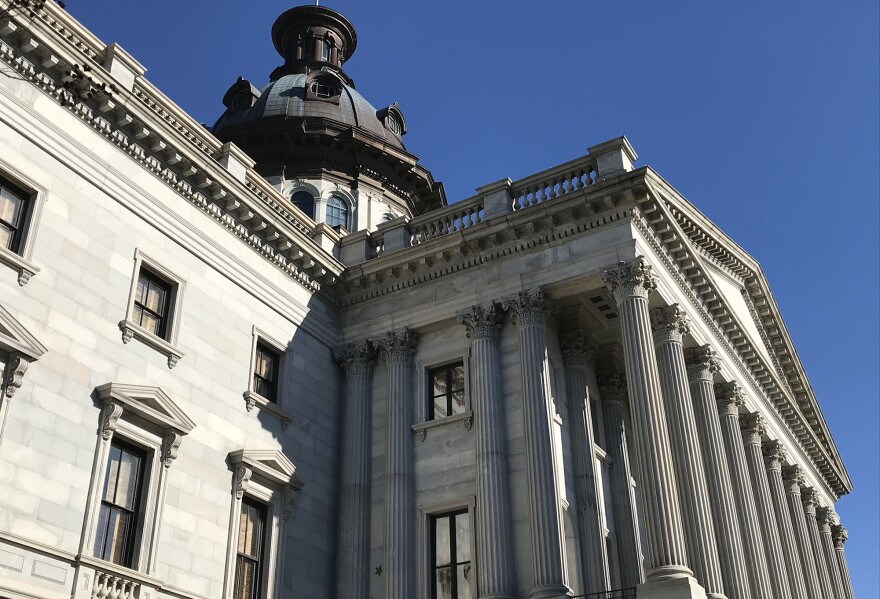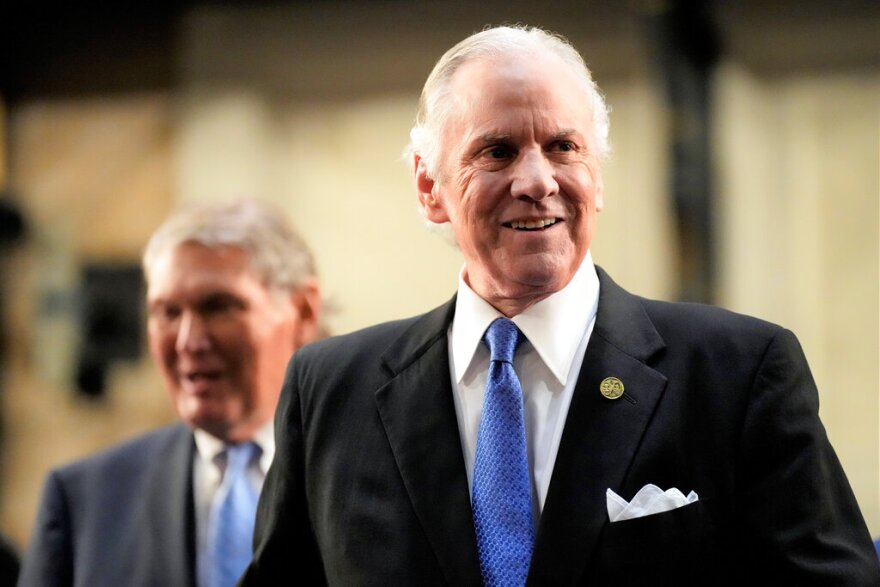Happy Wednesday.
And welcome back, briefly, to a special edition of The State House Gavel, a daily reporter notebook by reporters Gavin Jackson, Russ McKinney and Maayan Schechter that previews and captures what goes on at the South Carolina Statehouse while lawmakers are in session.
Lawmakers have returned to Columbia for one day only to pass the $14.5 billion state general fund budget.
It then will be sent to Gov. Henry McMaster, who has line-item veto power.
And while he may use it this year, Statehouse leaders are unlikely to call their colleagues back to Columbia this summer to vote to override any vetoes that do not fundamentally alter the bill.
Below, we break down what lawmakers included in next fiscal year's budget, which goes into effect July 1. We also explain what you can expect to see when lawmakers get to the floor.
The Senate gavels in at noon. The House returns at 1 p.m.
Also happening Wednesday: McMaster at 10:30 a.m. will hold a ceremonial bill signing for H. 3430, the liquor liability/tort reform legislation passed this year. SCETV will livestream.
ICYMI: For a recap of this year's legislative session, watch SCETV's May 16 This Week in South Carolina episode hosted by Gavin Jackson as he speaks with SC Public Radio's Maayan Schechter, Associated Press's Jeffrey Collins, The State newspaper's Joseph Bustos and WIS TV's Mary Green about the session's highlights.

What's in the 2025-2026 budget?
For the first time since 1995, the state budget includes a measure to raise in-district expense pay for South Carolina's 170 legislators — what proponents of the hike say is long overdue.
The plan will boost lawmakers' in-district pay from $1,000-a-month to $2,500-a-month, equal to $18,000 per year at a total cost of about $3 million.
That increase comes on top of what lawmakers are paid yearly — most lawmakers earn $10,400 per year, with the exception of those who hold leadership titles — and per diem.
The $14.5 billion general fund plan also includes:
- More than $290 million to lower the state's top income tax rate down to 6% from 6.2%
- Nearly $106 million to cover state and school employees' and health plan premiums and more than $66 million to raise all full-time equivalent employees to a new pay band, or 2%
- $80 million for teacher pay raises of $1,500, bringing the starting salary to $48,500
- More than $71 million for tuition mitigation efforts to keep in-state tuition low, including more than $12 million for Clemson University and more than $14.4 million for the University of South Carolina
- Nearly $85 million to maintenance, renovations and repairs at the state's technical colleges
- $10 million to modernize the public health department's IT system
- $4 million for opioid treatment services and $150 million for neurological critical care and rehabilitation services in the state
- More than $60 million for Medicaid costs
- $4 million for early care and education at the social services department
- More than $5 million for air quality and drinking water programs
- $25 million for modernizing the Judicial Department's case management system
- $200 million to fix bridges and $35 million for the transportation department to respond to Hurricane Helene damage
- $12 million for veteran home operating costs
- Nearly $11 million to upgrade the state's voting system
- More than $10 million for capital upgrades at local airports
- More than $40 million to cover costs associated with the state's Education Scholarship Trust Fund, what covers K-12 private school tuition and other education-related costs. (The state is likely to face a second lawsuit over the constitutionality of the tuition spending.)
And that is not all that the state budget will cover come July 1.
You can view the full budget conference report here.
In addition to spending, lawmakers also adopted a handful of policy provisos, or one-year laws attached to the state budget that have a funding component.
That includes the provision to raise in-district pay and to allow the purchase of lottery tickets by debit cards, currently prohibited in South Carolina.
It also includes a measure that would cut state aid from local governments if they have an ordinance banning the practice of conversion therapy.
The city of Columbia is the only city with that ban.
What's not in this year's budget?
Earmarks.
Earmarks — or community investments as lawmakers often refer to them — are the traditional method lawmakers have for years used to provide funding for local projects, like parks, community centers and other various local civic organizations.
The money has also gone to law enforcement and road improvements.
Senate Finance Committee Chairman Harvey Peeler, R-Cherokee, said it’s the first time ever the budget has not included earmarks.
That decision by the respective chamber budget chairs was made ahead of this month's revenue projections released by the S.C. Board of Economic Advisors.
ICYMI: The BEA reported that tax revenue growth remained greater than projected. Revenue for the month of April alone was $266 million above projections.
In their final revenue projections, the BEA said the Legislature had an additional $377 million in recurring (yearly) revenue, and $669 million in one-time money to spend.
House Ways and Means Committee Chairman Bruce Bannister, R-Greenville, of Greenville called the spending plan “responsible,” noting to reporters this month that budget writers didn’t spend all of the tax revenue that was available.
What should the public expect to see?
The final budget debate in the House and Senate will only be one day. But that doesn't mean there won't be lengthy debate — at least in the House.
The more than a dozen hardline House Freedom Caucus members, who already opposed previous iterations of the spending plan, plan to oppose this budget as well.
The caucus will hold a 12:30 p.m. Wednesday press conference.
Unlike previous debates, lawmakers can't amend the budget conference report, negotiated by six House and Senate members of their chamber's respective budget committees.
Instead, the House and Senate will give an up or down vote.
It'll be ratified, then head to Gov. Henry McMaster's desk.

Will SC lawmakers override gov vetoes?
Only three of the 95 laws/resolutions that the Legislature passed into law this year have been vetoed by Gov. McMaster.
They are:
- H. 3969: The so-called personal delivery devices bill that would regulate the food delivery robots on the University of South Carolina's Columbia campus. In his veto message, McMaster said while he "appreciates" the aim of the bill, it is "special legislation" that only affects Richland County and as a result he must veto. House Minority Leader Todd Rutherford, D-Richland, was the lead sponsor.
- S. 136: Filed by Charleston Democratic Sen. Deon Tedder, the bill would dismiss pending charges for unlawful gun possession if someone were charged before the state's constitutional carry law. In his veto message, McMaster — a former state prosecutor — said he was "wary" of limiting a prosecutor's authority and discretion. The governor vetoed similar legislation last year. The Senate overrode his veto but the House did not.
- S. 623: The bill deals with the exemption of certain building requirements in Georgetown County. The legislation was sponsored by Sen. Stephen Goldfinch, R-Georgetown. Similar to the personal delivery devices, McMaster in his veto message said the bill was "special legislation" that only affected Georgetown. He also referenced recent court action.
Both chambers must agree to override those vetoes.

Daily planner (5/28)
SC House
- 10 a.m. — Blatt 110 — Insurance Rate Review Ad Hoc Committee
Agenda Available
Live Broadcast
Live Broadcast - Audio Only - 11:30 a.m. — Blatt 516 — S.C. Department of Transportation Modernization Ad Hoc Committee
Agenda Available
Live Broadcast
Live Broadcast - Audio Only - 1 p.m. — House in session
Live Broadcast
Live Broadcast - Audio Only
SC Senate
- 9 a.m. — Gressette 308 — Banking and Insurance, Insurance Subcommittee S.342
Agenda Available
Live Broadcast
Live Broadcast - Audio Only - Noon — Senate in session
Live Broadcast
Live Broadcast - Audio Only
SC governor
- 10:30 a.m. — Gov. Henry McMaster and Lt. Gov. Pamela Evette to hold ceremonial bill signing for H. 3430, the liquor liability/tort reform legislation.

Clips from around the state
- Columbia leaders warn of $3.7M budget loss as City Council delays conversion therapy ban vote again (SC Public Radio)
- New law requires seatbelts for children riding in golf carts on SC roads (SC Daily Gazette)
- This SC nonprofit is quietly funding women seeking abortions. They don't plan to back down. (Post and Courier)
- New South Carolina law expands free lunch access, bans meal-shaming (WLTX)
- How federal cutbacks and red tape are affecting food availability in rural South Carolina and beyond (SC Public Radio)
- Volvo Cars announces 3,000 global job cuts on heels of SC layoffs (Post and Courier)
- Do state actions concerning Columbia’s conversion therapy ban violate local rule? (WIS)
- Here's what South Carolina politicians, parties had to say about passage of spending bill (The Greenville News)
- Efforts to clear South Carolina coast of abandoned boats face funding hurdles (WCIV)
- Will SC's protected coastal waters remain safe from seismic testing? A new bill could lift the ban. (Post and Courier)






